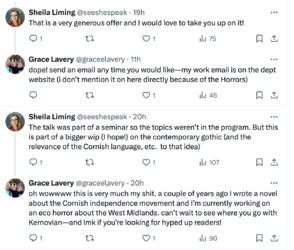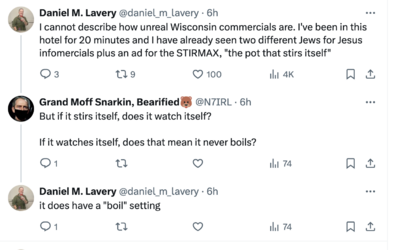- Joined
- Mar 10, 2023
Did we know that Joe wrote a novel about the Cornish independence movement? Well, now we do. Also, right now he's writing an eco horror about the West Midlands. You can take the spotted dick out of England but you can't..... etc.

Yes, he refers Shiela to Berkeley's English Dept. page for his email. Like he's there forever.
Joe's wife is in Madison, preparing for this afternoon's book chat.


Sheila Liming @seeshespeak
19h
That is a very generous offer and I would love to take you up on it!
Grace Lavery @graceelavery
11h
dope! send an email any time you would like—my work email is on the dept website (i don’t mention it on here directly because of the Horrors)
Sheila Liming @seeshespeak
20h
The talk was part of a seminar so the topics weren’t in the program. But this is part of a bigger wip (I hope!) on the contemporary gothic (and the relevance of the Cornish language, etc. to that idea)
Grace Lavery @graceelavery
20h
oh wowwww this is very much my shit. a couple of years ago I wrote a novel about the Cornish independence movement and I’m currently working on an eco horror about the West Midlands. can’t wait to see where you go with Kernovian—and lmk if you’re looking for hyped up readers!
19h
That is a very generous offer and I would love to take you up on it!
Grace Lavery @graceelavery
11h
dope! send an email any time you would like—my work email is on the dept website (i don’t mention it on here directly because of the Horrors)
Sheila Liming @seeshespeak
20h
The talk was part of a seminar so the topics weren’t in the program. But this is part of a bigger wip (I hope!) on the contemporary gothic (and the relevance of the Cornish language, etc. to that idea)
Grace Lavery @graceelavery
20h
oh wowwww this is very much my shit. a couple of years ago I wrote a novel about the Cornish independence movement and I’m currently working on an eco horror about the West Midlands. can’t wait to see where you go with Kernovian—and lmk if you’re looking for hyped up readers!
Joe's wife is in Madison, preparing for this afternoon's book chat.

Daniel M. Lavery @daniel_m_lavery
6h
I cannot describe how unreal Wisconsin commercials are. I've been in this hotel for 20 minutes and I have already seen two different Jews for Jesus infomercials plus an ad for the STIRMAX, "the pot that stirs itself"
Grand Moff Snarkin, Bearified @N7IRL
@N7IRL
6h
But if it stirs itself, does it watch itself?
If it watches itself, does that mean it never boils?
Daniel M. Lavery @daniel_m_lavery
6h
it does have a "boil" setting
6h
I cannot describe how unreal Wisconsin commercials are. I've been in this hotel for 20 minutes and I have already seen two different Jews for Jesus infomercials plus an ad for the STIRMAX, "the pot that stirs itself"
Grand Moff Snarkin, Bearified
6h
But if it stirs itself, does it watch itself?
If it watches itself, does that mean it never boils?
Daniel M. Lavery @daniel_m_lavery
6h
it does have a "boil" setting




